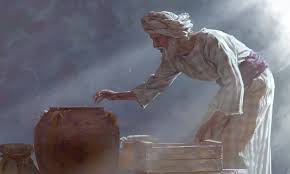Josiah Ruled For 31 Years from 640 to 609 BC

Josiah came to the throne at the tender age of eight, after the fifty-two year reign of his evil father Manasseh (Second Chronicles 33:1-25) and he reigned 31 years (Second Kings 22:1 to 23:30; Second Chronicles 34:1 to 35:27). Manasseh’s reign had been marked by political and religious regression. Politically the country was forced to submit to Assyria. The reforms started by Hezekiah had been forgotten the people had reverted to brazen idolatry, with all its impure orgies and gruesome rites practiced at the rural sanctuaries on every high hill and under every leafy tree. Superstition was rampant, interpreting omens and sorcery raised its ugly heads again, and human sacrifice was reintroduced. Manasseh himself making his own son pass through the fire of Molech. Temple worship was vigorously suppressed. Small wonder, then, that the worship of ADONAI and the study of the Torah had completely disappeared. Such was the sad state of affairs when Josiah was crowned king.

According to Second Kings 22-23 and Second Chronicles 34-35 a major reform took place in Judah during Josiah’s reign. According to Kings the entire reform – the purge of idol worship, the covenant renewal ceremony, and the celebration of Passover – took place in 622 BC. In the king’s eighteenth year, while the Temple was being repaired, the scroll of Deuteronomy was found by Hilkiah, the high priest, beneath an accumulation of rubbish. He handed it to Shaphan the scribe, who in turn read it to the king. This is sometimes called “the Second Torah” because it contains, or repeats, many of the commandments already found in the books of Genesis, Exodus, Leviticus and Numbers for a new generation (see the commentary on Deuteronomy Ai – These are the Words Moses Spoke). The difference being that Deuteronomy takes many of the commandments in the other four books of Moses and puts them into a covenant system. It follows a format that was typical of covenants in the ancient world between a great king and lesser kings under him.
There were blessings spelled out for obedience, and cursings for disobedience in the scroll of Deuteronomy. Imagine the impact of that reading. Here is Josiah, disgusted with the evil of his father and determined to do something about it, but not knowing quite how. He had no blueprint, no direction, and no counsel. The only thing he inherited from his father was fifty-two years of wickedness. Now the king had this powerful scroll about the love of ADONAI and our worship of Him, clear definitions of what is right and wrong, and explicit directions on how to make moral decisions and conduct true worship.
Josiah realized the full extent of the people’s apostasy and what his father had done meant the curses of Deuteronomy were going to visit Judah unless something was done. The young king’s response was swift and commanding. He immediately put into action everything that he read. Now that he knew what true worship was, he banished every single vestige of false worship. The government-subsidized immorality was wiped out. The cult prostitutes who had special housing in the Temple were banished. The magicians and sorcerers who had set up shop in the Temple precincts were scattered. Josiah dispatched his representatives throughout Y’hudah announcing what was discovered in this scroll. Old altars were torn down and the people taught the way of faith. The muck of a half-century of corruption was shoveled out of the City, out of the Land. So in the twelfth year of his reign (629/628 BC) Josiah began a revival throughout the country (Second Kings 23:1-5, 20-21, 24), one year before Jeremiah was called to his prophetic ministry.
After the scroll of Deuteronomy was found, a covenant renewal ceremony was performed. All the false gods and images of the southern kingdom of Judah (the same ones as were in the northern kingdom of Isra’el who had already been taken away into captivity by Assyria) were destroyed. Moreover, Josiah destroyed the two golden calves in Dan and Bethel (First Kings 12:28) that had been set up by Jeroboam. The rural sanctuaries were dismantled and their priests disqualified from officiating in the Temple, though to prevent them from forming a separate religious party, and perhaps also on humanitarian grounds, they were granted an allowance. The Temple was purified and Josiah ordered the national observance of Pesach.
The reform was accomplished. Everything that a king’s commands could do were done: conspicuous crime was stopped; superstitious religion was sent packing; immoral worship was banned. And Jeremiah had a ringside seat in the arena of reform. But getting rid of evil did not make the people good. It didn’t take him long to realize that the reform was only skin-deep. Everything had changed, but nothing had changed. The outward changes had been enormous; the inward changes were hardly noticeable.13
The reform, however, lasted only as long as Josiah lived. Jeremiah had no doubt enthusiastically welcomed the reform, but he was soon chagrined when he realized its superficial character and how quickly the people reverted to their idolatrous abuses. The spiritual condition took a dramatic turn for the worse and was a sorry state of affairs for what remained of the once proud Isra’el. Her demise came quickly.
In 632 BC in the eighth year of his reign, while he was still young, Josiah began to seek the God of his father David (Second Chronicles 34:3a).
In 629/628 BC in his twelfth year he began to purge Judah and Jerusalem of high places, Asherah poles and idols (Second Chronicles 34:3b).
In 627 BC Jeremiah was appointed as a prophet to the nations (1:4-5). He prophesied for about 45 years, about the same length of time Isaiah did.
In 626/625 BC Babylon became independent of Assyria and Nabopolassar became king.
In 622 BC during the king’s eighteenth year, the scroll of Deuteronomy was found in the Temple.
By 616 BC Egypt and Assyria were becoming allies as Babylon grew in power.
In 612 BC Nineveh was overthrown by a coalition of Babylonians, Medes and Scythians. Consequently, Assyria moved its capital to Harran.
In 612 BC After Nineveh fell, the Assyrian Empire was on the decline. This, along with Babylon’s rise created a realignment of power throughout the region. If a weakened Assyria could be maintained as a buffer state to halt Babylon’s westward advances, Egypt would be free to reclaim much of western Palestine, including Judah, which she had lost to Assyria earlier. Though Egypt had always feared a powerful Assyria, she was now faced with an even more powerful Babylon. So Egypt entered the conflict between Assyria and Babylon as Assyria’s ally. After Nineveh fell in 612 BC the Assyrians moved their refugee government 240 miles west to Haran in Upper Mesopotamia. Two years later, in 610 BC, the Babylonian army drove the Assyrians from Haran as well.
At this point a new Pharaoh, Necho II, ascended the throne of Egypt. He decided that the Babylonian presence at Haran was too close for comfort, so the following spring the Egyptian army marched north to try to support the remaining Assyrian forces in a last ditch attempt to retake their crumbling empire. Josiah had no liking for the march of an Egyptian army through his realm, particularly when the Egyptians were coming to the aide of Assyria, Judah’s old enemy. He therefore, attempted to block the progress of the Egyptian army at Megiddo (about fifty-five miles north of Jerusalem). But in 609 BC Josiah died at the hands of the Egyptians on the plain of Megiddo. This entire scene is summarized in a single verse in Second Kings 23:29. The news must have stunned Judah: here a king who was unparalleled in goodness (Second Kings 23:25), was struck down at the age of thirty-nine: Second Chronicles 35:20-35 records that his death was commemorated for generations.14
This event was more than a political setback. Those who practiced idolatry saw the king’s death to be a judgment upon Josiah for the gods banished by him, and so his defeat and death further undermined his reforms and gave a renewed impetus to idol-worship. Judah would then be in a spiritual death spiral that would last the entirety of Jeremiah’s forty-five-year ministry.
Unable to defeat the Babylonians at Haran, the Egyptians withdrew and the Assyrian influence over the Near East became insignificant by 609 BC (to see link click Gu – Seventy Years of Imperial Babylonian Rule).



Leave A Comment